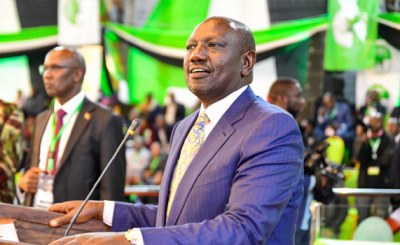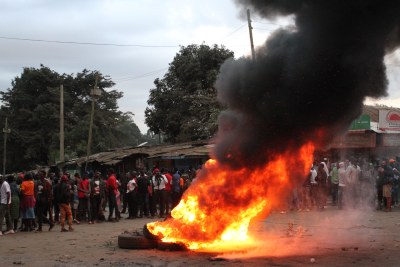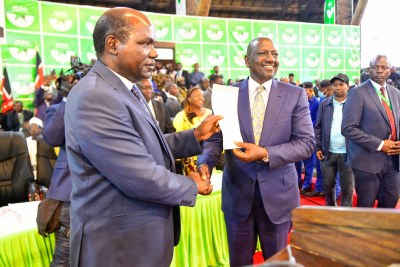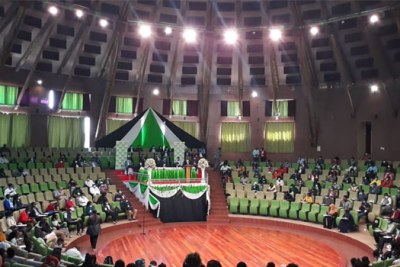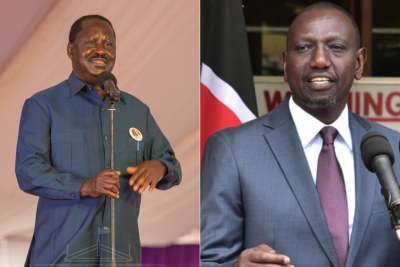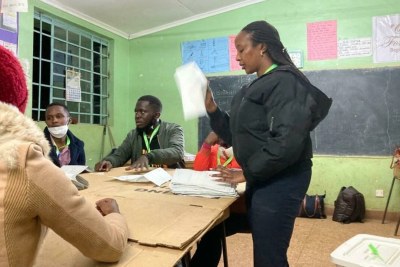-
Kenya: What William Ruto's Presidency Would Mean for Economy
The Conversation Africa, 16 August 2022
William Ruto has been declared the winner of Kenya's 2022 presidential election. The close results have been queried, raising the risk of a prolonged political transition. But, if… Read more »
-
Kenya: Ruto Will 'Engage' Any Challenge to His Election Victory
DW, 17 August 2022
President-elect William Ruto promised he would not give in to "blackmail" after his rival Raila Odinga pledged to contest the disputed election. Ruto also promised to reduce ethnic… Read more »
-
Kenya: Kenya Kwanza to Hold Inaugural Meeting of Elected Leaders on August 17
Capital FM, 16 August 2022
The Kenya Kwanza Alliance is set to have its inaugural meeting of elected leaders in the just concluded general election that will bring together governors, Members of the National… Read more »
-
Kenya: Kenya After the Elections
DW, 17 August 2022
The aftermath of elections in Kenya have been calmer than previous years. Even though the defeated presidential candidate has rejected the results, citizens are simply keen to get… Read more »
-
Kenya: President-Elect Ruto Urged to Reach Out to Kenyatta
Capital FM, 16 August 2022
The National Council of Non-Government Organizations (NGOs) has urged President-elect William Ruto to reach out to his predecessor Uhuru Kenyatta and his main rival in the just… Read more »
-
Kenya: Supreme Court Ready for Presidential Petitions
Capital FM, 16 August 2022
The Supreme Court has made elaborate plans to receive any petition against Monday's declaration by the electoral commission on final presidential results. Read more »
-
Kenya: Businesses Remain Optimistic of Resumption in Activities After Polls
Capital FM, 16 August 2022
Businesses in Nairobi have remained positive about resumption in activities as the election period comes to an end. Read more »
What William Ruto's Presidency Would Mean for Kenya's Economy
William Ruto has been declared the winner of Kenya's 2022 presidential election. The close results have been queried, raising the risk of a prolonged political transition. But, if cleared, Ruto is set to inherit an economy that's not in great shape. The unemployment rate is running high - a fact that fuelled youth resentment against the government of outgoing president Uhuru Kenyatta. Kenya's economy generates less than 200,000 formal jobs for the over one million young people who join the labour market every year. The country is also grappling with huge public debt and a high inflation rate.
While Ruto has promised "bottom-up" economic transformation, his role as deputy president in the previous administration provides little indication of his ability, or will, to push through transformative economic policies.
Ruto's victory means Kenyans face more of the status quo. He, and the coalition behind him, seem to be firm believers in the market economy where the government hardly intervenes in production and price setting, write Kathleen Klaus, Oscar Gakuo Mwangi and Xn Iraki for The Conversation.
Meanwhile Capital FM reports that the Kenya Kwanza Alliance is set to have its inaugural meeting of elected leaders in the just-concluded general election that will bring together governors, members of the national assembly, women representatives and senators on August 17, 2022. The National Council of Non-Government Organizations has urged Ruto to reach out to predecessor Uhuru Kenyatta and his main rival in the election Raila Odinga, while emphasising the need for the three leaders to reason together for the good of the country.
On the other hand, the Supreme Court has made elaborate plans to receive any petition against the declaration by the electoral commission on the final presidential results.
InFocus
-
Kenya's William Ruto was declared the winner of the August 9, 2022, election in the midst of chaotic scenes last witnessed on the eve of the infamous 2007-2008 po Read more »
-
Deputy President William Ruto has been declared President-Elect after sailing past the '50 per cent plus one' constitutional threshold that requires a winner in a presidential ... Read more »
-
While Kenyans anxiously wait to hear who will hold the highest office in the land - the presidency- other results have been trickling in for governor, senator and member of ... Read more »
-
Final presidential results will be announced at the Independent Electoral and Boundaries Commission's national tallying centre, based in a tourist village known as the Bomas of ... Read more »
-
The vote count to determine Kenya's is under way. "Transmission of results has started," Independent Election and Boundaries Commission (IEBC) chairperson Wafula Chebukati sa Read more »
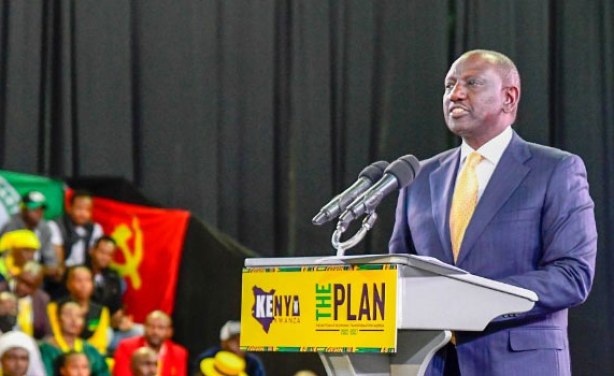
President-elect William Ruto unveiling the Kenya Kwanza Alliance manifesto at the Kasarani Indoor Arena in Nairobi (file photo).
